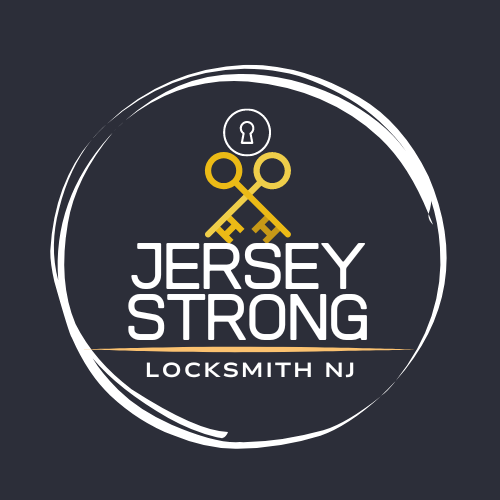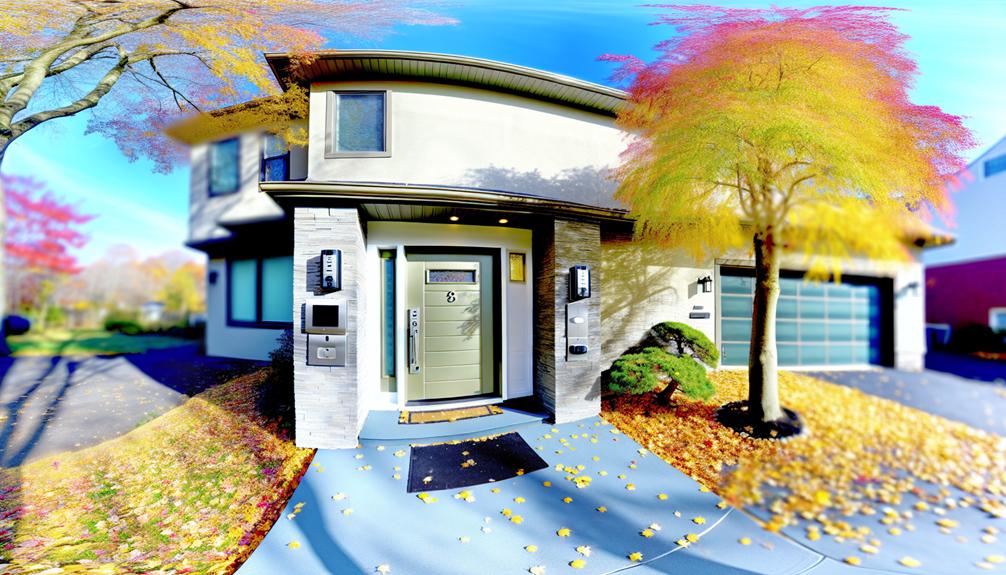For New Jersey homes in 2024, we suggest smart locks with advanced encryption, strong remote access, and stylish designs. High-rated options like the Schlage Encode offer extended battery life and customizable settings. For keyless entry, models such as the Yale Assure Lock SL utilize biometric technology and secure digital codes. Wi-Fi enabled locks guarantee real-time monitoring and seamless home automation integration. Weather-resistant models, fortified against corrosion and impact, are essential for New Jersey’s varied climate. Budget-friendly picks like Wyze Lock and August Smart Lock (3rd Gen) provide reliable security without breaking the bank. Stay tuned for an in-depth look at each recommendation.
Key Takeaways
- Weather-resistant models ensure effective operation in New Jersey’s diverse climate, with features like waterproof sealing and temperature tolerance.
- High-security selections with advanced encryption, biometric authentication, and tamper-resistant designs provide robust home security.
- Wi-Fi enabled models offer seamless integration with smart home systems and user-friendly mobile apps for remote access and monitoring.
- Extended battery life and low-battery notifications minimize maintenance needs, ensuring reliability throughout harsh winter months.
- Biometric features like fingerprint and facial recognition offer convenient, secure, and customizable entry options, ideal for busy households.
Top-Rated Smart Locks
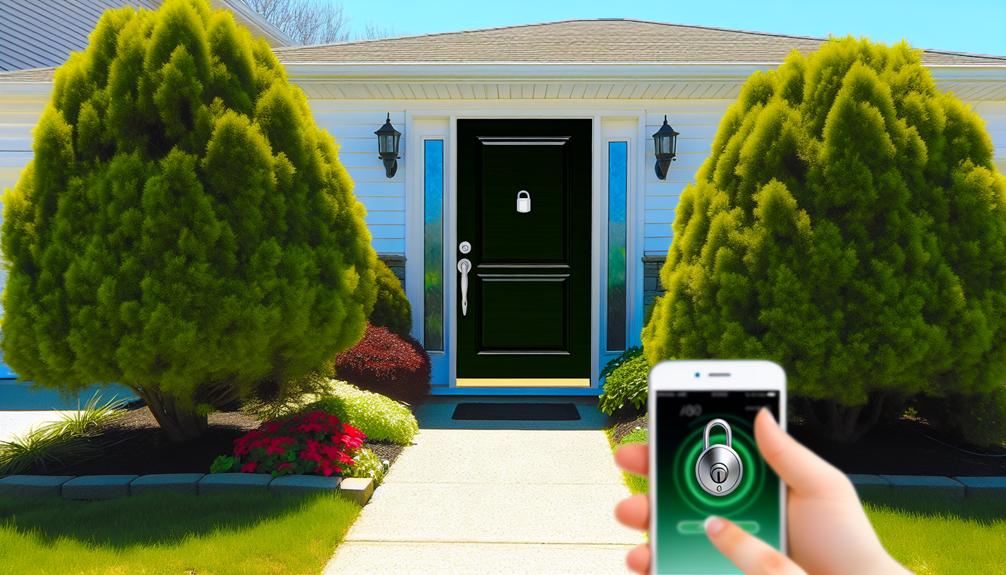
When evaluating the top-rated smart locks for New Jersey homes, we must consider factors like security features, integration with home automation systems, and ease of installation.
First and foremost, smart locks with robust remote access capabilities allow us to control and monitor our locks from anywhere, providing peace of mind and heightened security. Brands like August and Schlage offer advanced encryption protocols, ensuring that unauthorized access is virtually impossible.
Design aesthetics also play a pivotal role. A lock must seamlessly blend with our home’s decor. High-end models often feature sleek, modern designs with customizable settings, allowing us to tailor functions such as auto-lock timing and user access codes to our specific needs.
Battery life longevity is another vital aspect. We don’t want to be caught off guard with a dead lock. Models like the Yale Assure Lock SL boast extended battery life, often lasting up to a year on a single set of batteries. Additionally, many smart locks now include low-battery notifications via connected apps, ensuring we’re always informed.
Incorporating these elements, the top-rated smart locks not only enhance security but also offer convenience and control, making them ideal for discerning New Jersey homeowners.
Keyless Entry Options
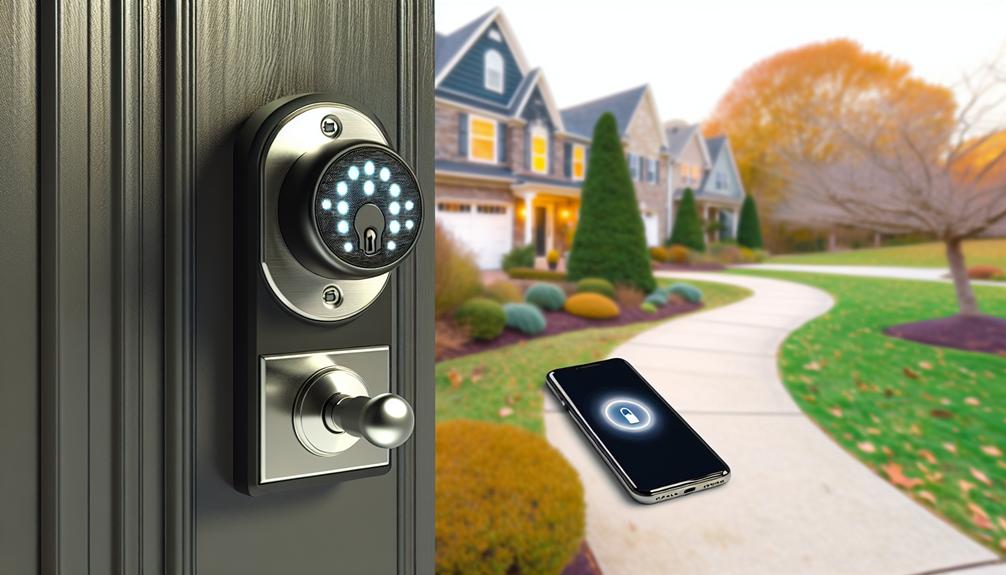
Keyless entry options, leveraging cutting-edge biometric technology and secure digital codes, offer unparalleled convenience and enhanced security for New Jersey homes. By eliminating traditional keys, we gain a significant advantage in terms of both security and ease of use.
The integration of remote access functionalities means we can control and monitor our home’s entry points from virtually anywhere. This feature provides a newfound level of control, allowing us to lock or open doors through a smartphone app, ensuring our homes are secure even when we’re not physically present.
Keyless convenience extends beyond mere access control. These systems often include customizable access codes, allowing us to grant temporary or permanent entry to family members, guests, or service providers without the need for physical keys. The digital nature of these codes means they can be easily changed or revoked, enhancing security by mitigating the risks associated with lost or stolen keys.
Furthermore, many keyless entry systems incorporate advanced encryption protocols, ensuring that our digital codes and remote access commands are protected against potential cyber threats. This combination of convenience and robust security makes keyless entry systems an ideal choice for modern New Jersey homes seeking both advanced functionality and peace of mind.
Biometric Features
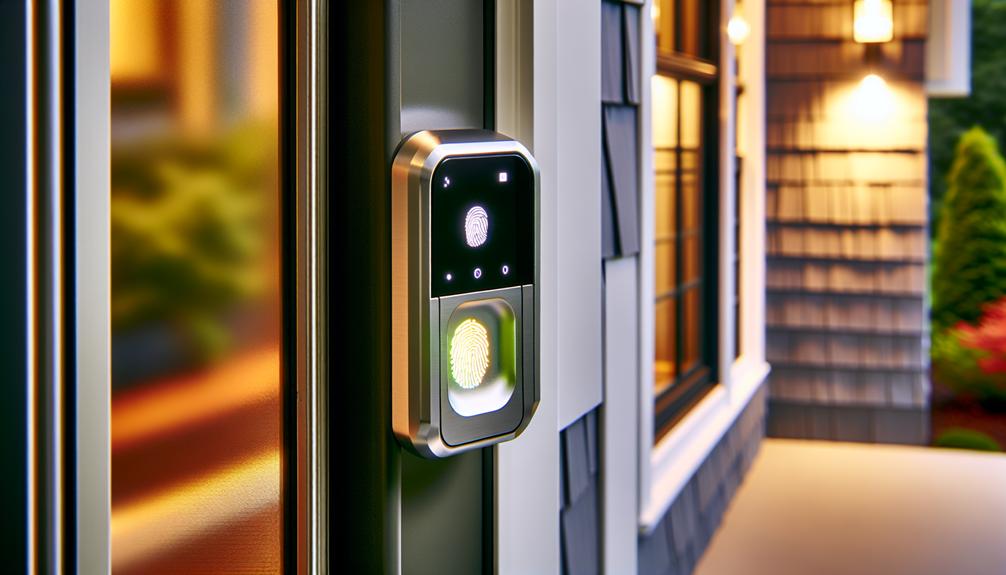
Let’s explore the biometric features of smart locks, focusing on fingerprint recognition accuracy and facial recognition capabilities.
We’re aware that modern fingerprint sensors boast an impressive false acceptance rate (FAR) of less than 0.001%, ensuring high security.
Additionally, facial recognition systems now utilize advanced algorithms and infrared technology to authenticate users even in low-light conditions, greatly enhancing reliability.
Fingerprint Recognition Accuracy
Fingerprint recognition accuracy, a vital component of biometric security systems, hinges on the sensor’s resolution, algorithm efficiency, and the quality of the fingerprint image captured. Over the past few years, we’ve seen significant accuracy improvements driven by advancements in sensor technology and machine learning algorithms.
High-resolution sensors now capture more detailed fingerprint images, allowing for more precise identification with reduced false acceptance and rejection rates.
Despite these advancements, reliability concerns persist. Environmental factors such as moisture, dirt, and even slight abrasions on the skin can impact the effectiveness of fingerprint recognition. To address these issues, manufacturers are incorporating multi-spectral imaging techniques that penetrate the outer layer of the skin, capturing more consistent fingerprint data even under adverse conditions.
Algorithm efficiency also plays a vital role. Modern smart locks employ deep learning models trained on extensive datasets to enhance pattern recognition capabilities. This results in faster processing times and improved accuracy, ensuring that only authorized users gain access.
As we evaluate smart locks for New Jersey homes, we must prioritize models that offer robust fingerprint recognition systems. The goal is to balance technological sophistication with real-world reliability, ensuring our homes remain secure without sacrificing convenience.
Facial Recognition Capabilities
As we explore biometric security further, facial recognition capabilities offer an advanced and highly secure alternative to fingerprint recognition for New Jersey homes. Leveraging sophisticated algorithms and machine learning, facial recognition systems can accurately authenticate users by mapping and analyzing unique facial features. These systems guarantee a higher level of security by reducing the risk of spoofing and unauthorized access.
One of the primary advantages we find in facial recognition convenience is the seamless entry it provides. Users no longer need to fumble for keys or remember passwords; a simple glance at the smart lock suffices. This hands-free operation is particularly beneficial in the fast-paced environment of New Jersey, where efficiency is paramount.
However, it’s essential that we address facial recognition privacy concerns. Advanced encryption and local data storage are vital to protect user information from breaches. Many smart locks incorporate these features, ensuring that facial data remains secure and private. As technology evolves, these systems will likely become even more robust, providing homeowners with greater peace of mind.
Wi-Fi Enabled Models
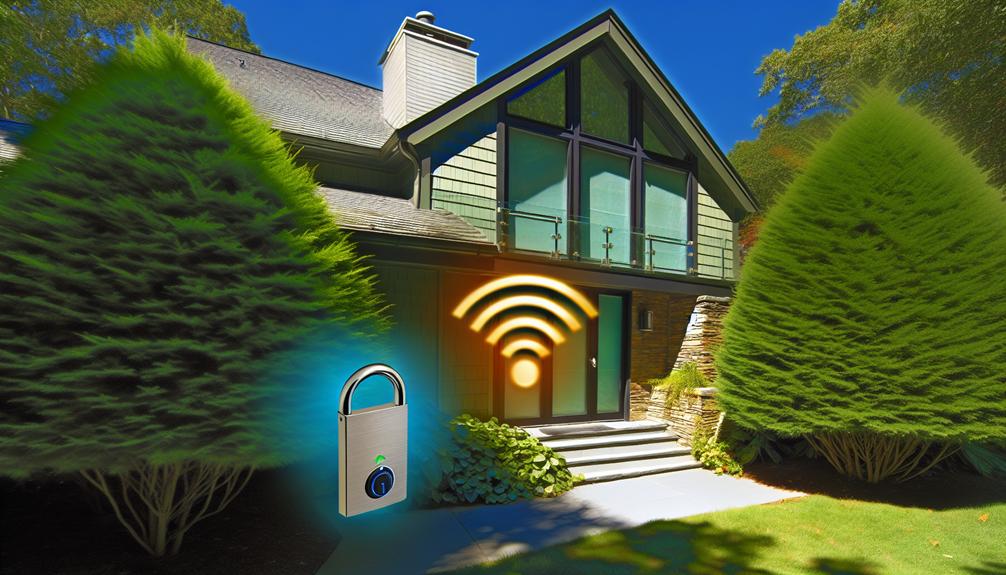
Wi-Fi enabled smart locks offer the convenience of remote access and real-time monitoring, making them an ideal choice for New Jersey homeowners seeking advanced security solutions. These models provide robust features that allow us to control and monitor our home’s security from anywhere.
A critical aspect to weigh is battery life. Wi-Fi enabled locks consume more power due to their constant connection to the network. Opting for models with efficient energy management systems is crucial. Many top-tier options alert us when the battery is low, guaranteeing we never lose access unexpectedly.
The benefits of remote access can’t be overstated. We can lock or open our doors from miles away, receive notifications about who enters and exits, and even integrate the lock with other smart home devices. This functionality offers unparalleled control and peace of mind.
Key features we should look for include:
- Extended battery life to minimize maintenance.
- High-definition real-time monitoring for enhanced security.
- Smooth integration with home automation systems.
- User-friendly mobile apps for intuitive operation.
- Advanced encryption protocols to safeguard our data.
These features guarantee that Wi-Fi enabled smart locks offer a sophisticated, reliable security solution for our homes.
Bluetooth Connectivity
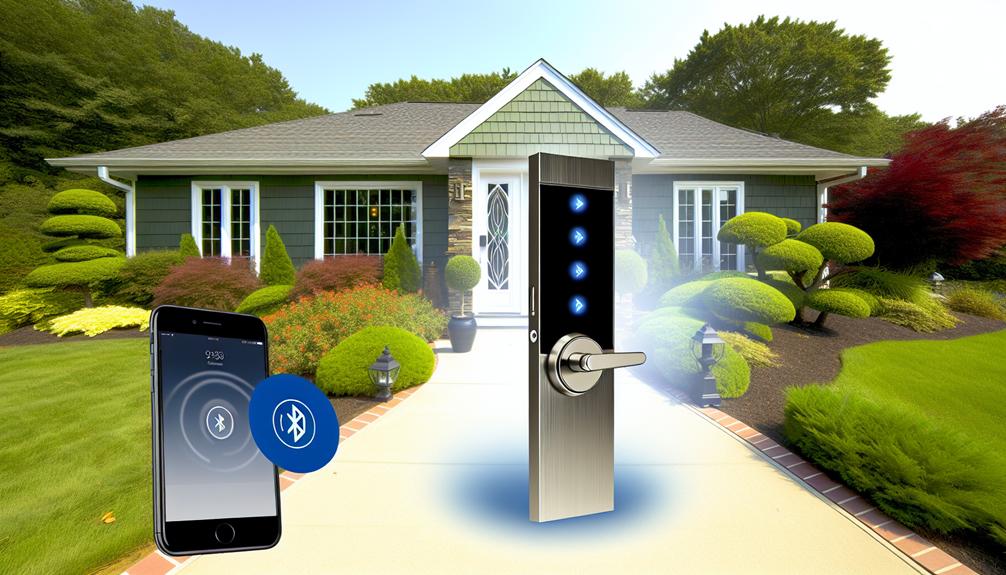
Bluetooth connectivity offers an alternative to Wi-Fi enabled smart locks, providing robust security features while conserving battery life through intermittent network usage. When we select a Bluetooth-enabled smart lock, we benefit from an extended battery lifespan since these locks only activate their connectivity features when within Bluetooth range. This efficient use of power ensures that our locks remain operational for longer periods without frequent battery replacements.
The key advantage here is the direct app connectivity. By utilizing dedicated mobile applications, we can manage access, monitor entry logs, and receive notifications in real time. These apps often come with user-friendly interfaces that facilitate easy setup and control, allowing us to customize lock functionalities to our specific needs.
It’s worth noting that the Bluetooth range typically extends up to 30 feet, ensuring reliable communication between our smartphone and the smart lock.
Additionally, security protocols within Bluetooth technology, such as AES encryption, further enhance the security of our homes. Unlike Wi-Fi, which may be vulnerable to broader network attacks, Bluetooth’s localized communication minimizes vulnerabilities.
For those of us seeking a balance between convenience and security, Bluetooth smart locks offer a compelling solution tailored to our modern, connected lifestyles.
Voice Control Compatibility
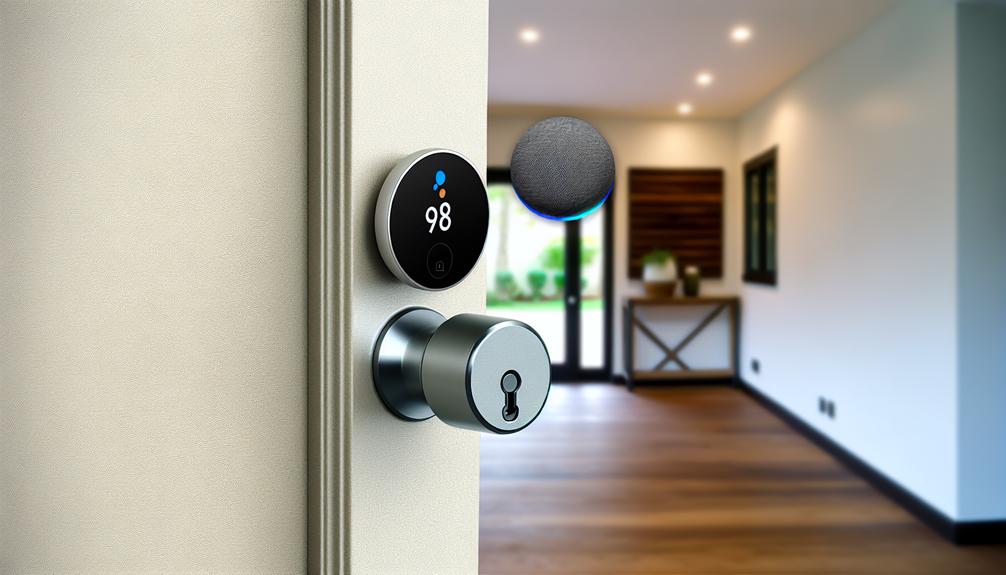
Voice control compatibility in smart locks enhances our home automation experience by seamlessly integrating with virtual assistants like Amazon Alexa and Google Assistant. This integration allows us to manage our smart lock security with simple voice commands, streamlining our daily routines and adding an extra layer of convenience.
The voice control benefits are numerous and include:
- Hands-free operation: We can lock or open doors without physically touching the lock, which is especially useful when our hands are full.
- Remote accessibility: Using voice assistants, we can control our locks from anywhere in the house, ensuring maximum flexibility.
- Enhanced security features: Voice-controlled smart locks can integrate with alert systems, notifying us of unauthorized access attempts in real time.
- User management: We can easily add or remove users by voice command, allowing for quick adjustments to access permissions.
- Routine automation: By setting up routines, we can automate locking and opening processes at specific times, boosting both security and convenience.
Smart lock security is paramount, and voice control enhances it by providing real-time updates and seamless management. By leveraging the capabilities of virtual assistants, we gain greater control over our home’s security infrastructure, ensuring peace of mind and a smoother, more efficient living environment.
Integration With Smart Homes
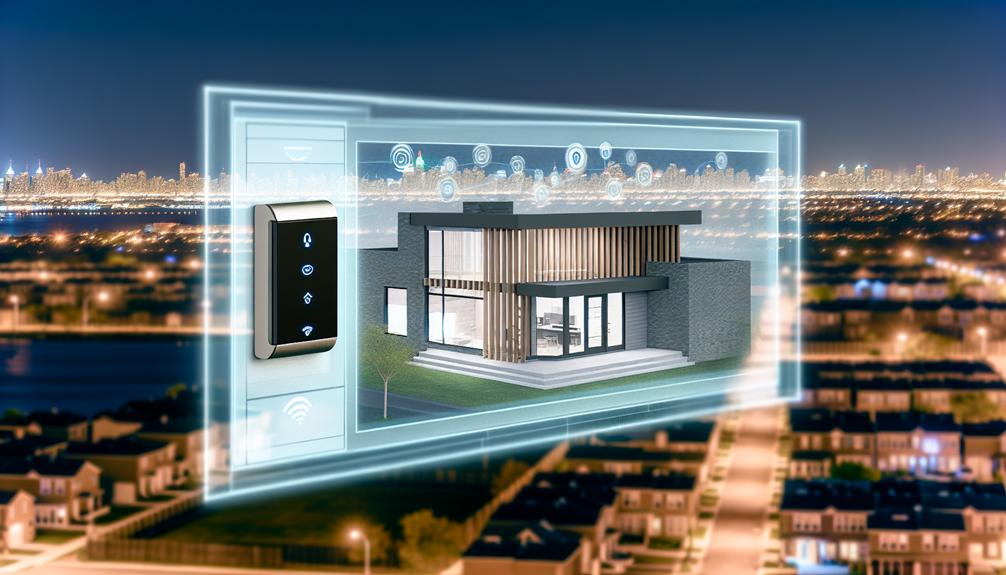
When we integrate smart locks with our home automation systems, compatibility is essential to guarantee seamless operation across devices. By leveraging voice assistant features, we can control access with simple commands, enhancing convenience and security.
Automation and scheduling capabilities allow us to program specific lock actions, such as auto-locking at night, providing an additional layer of protection and peace of mind.
Compatibility With Home Systems
Smart locks seamlessly integrate with various home systems, providing enhanced security and convenience through compatibility with IoT platforms and smart home ecosystems. Leveraging cutting-edge smart technology, we can transform our homes into sophisticated bastions of security and efficiency. Smart locks’ compatibility with home automation systems allows us to control access remotely, receive real-time notifications, and automate routines for a seamless living experience.
The interoperability of smart locks with different home systems opens up a myriad of possibilities:
- Smart Home Hubs: Integration with hubs like Samsung SmartThings or Hubitat Elevation enables centralized control.
- IoT Platforms: Compatibility with IoT platforms such as IFTTT allows for customizable automation triggers.
- Security Systems: Syncing with security systems like ADT Pulse or SimpliSafe enhances overall home security.
- Home Automation Systems: Integration with systems such as Control4 or Crestron elevates the smart home experience.
- Wireless Protocols: Support for protocols like Z-Wave, Zigbee, and Wi-Fi guarantees robust connectivity.
Voice Assistant Features
Integrating with voice assistants like Amazon Alexa, Google Assistant, and Apple Siri, smart locks offer an additional layer of convenience and control, allowing us to manage home security effortlessly through simple voice commands.
By merely speaking, we can lock or open our doors, check the status of our locks, and even integrate these commands into broader smart home routines. Nevertheless, this functionality brings privacy concerns and security risks to the forefront.
To mitigate these risks, advanced smart locks employ robust data encryption to protect our information from unauthorized access. End-to-end encryption ensures that commands transmitted between our voice assistants and smart locks remain secure.
Additionally, user authentication mechanisms, such as multi-factor authentication (MFA), add an extra layer of security. This means we can feel confident that only authorized users have control over our smart locks.
Despite these safeguards, we must remain vigilant about potential vulnerabilities. For instance, a compromised voice assistant could lead to unauthorized access if proper security measures aren’t in place.
Regularly updating firmware and employing strong, unique passwords for our smart home ecosystem can further enhance our security posture. By understanding and addressing these privacy concerns, we can fully leverage the benefits of voice assistant integration without compromising our home’s safety.
Automation and Scheduling
With the capacity to automate and schedule our intelligent locks, we can seamlessly integrate them into our wider smart home ecosystem, enhancing both convenience and security. By programming schedules and automations, we can guarantee our doors secure and open at specified times, providing us with unparalleled control and peace of mind.
Remote access allows us to manage our locks from anywhere, making certain that we can let in guests or service providers even when we’re not home. This feature is particularly useful for managing access without physically being present, making our lives considerably more flexible.
Here’s what we can achieve with automation and scheduling:
- Automated Locking/Unlocking: Set specific times for your doors to secure or open automatically.
- Integration with Other Devices: Sync with lights, thermostats, and security systems for a comprehensive smart home experience.
- Temporary Access Codes: Generate time-sensitive codes for guests, ensuring security and convenience.
- Energy Efficiency: Optimize energy usage by coordinating with other smart devices.
- Real-Time Alerts: Receive immediate notifications for any access attempts, keeping us informed and secure.
Easy Installation Picks
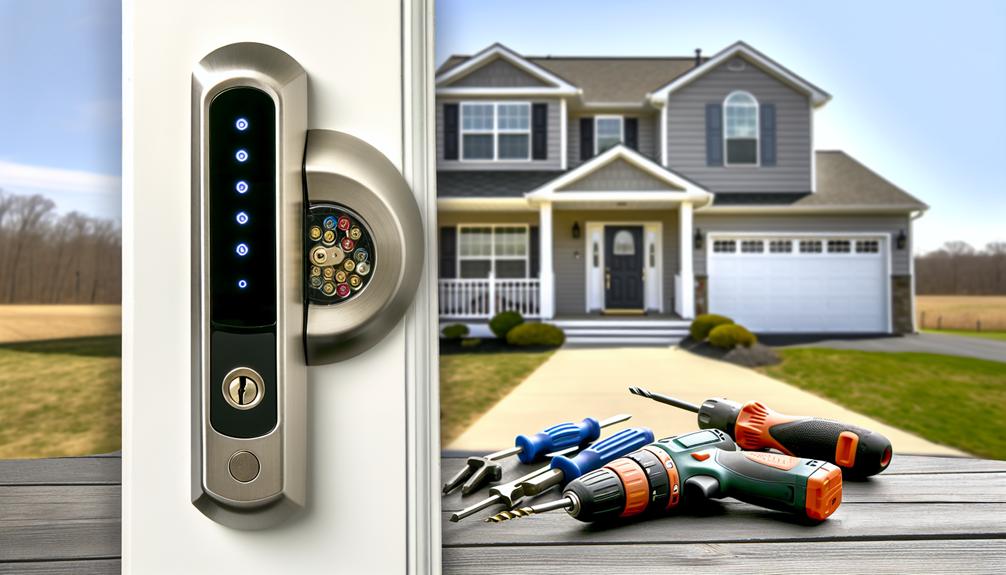
Leveraging the simplicity of modern design, our top picks for easy-to-install smart locks guarantee that homeowners can upgrade their security systems without the necessity for professional help. We emphasize DIY over professional installation for those who prefer hands-on control. Let’s get into some installation tips and discuss smart lock compatibility with existing door hardware.
Many smart locks today are designed for simple installation, typically involving just a screwdriver and about 10-15 minutes of your time. When selecting a smart lock, verify compatibility with your current door hardware. This guarantees smooth integration and avoids potential complications.
| Smart Lock Model | Key Feature | Installation Time |
|---|---|---|
| August Wi-Fi Smart Lock | Retrofit design, fits existing deadbolts | 10 minutes |
| Schlage Encode | Built-in Wi-Fi, no additional hubs | 15 minutes |
| Yale Assure Lock SL | Keyless touchscreen, Z-Wave compatible | 10 minutes |
From our experience, the August Wi-Fi Smart Lock stands out due to its retrofit design, making it ideal for those who don’t want to replace their existing deadbolts. Schlage Encode’s built-in Wi-Fi eliminates the need for additional hubs, streamlining the process. Yale Assure Lock SL is a keyless solution that’s Z-Wave compatible, providing flexibility for smart home integration. By focusing on easy installation, we guarantee you’ll spend less time fiddling with tools and more time enjoying enhanced security.
Budget-Friendly Choices
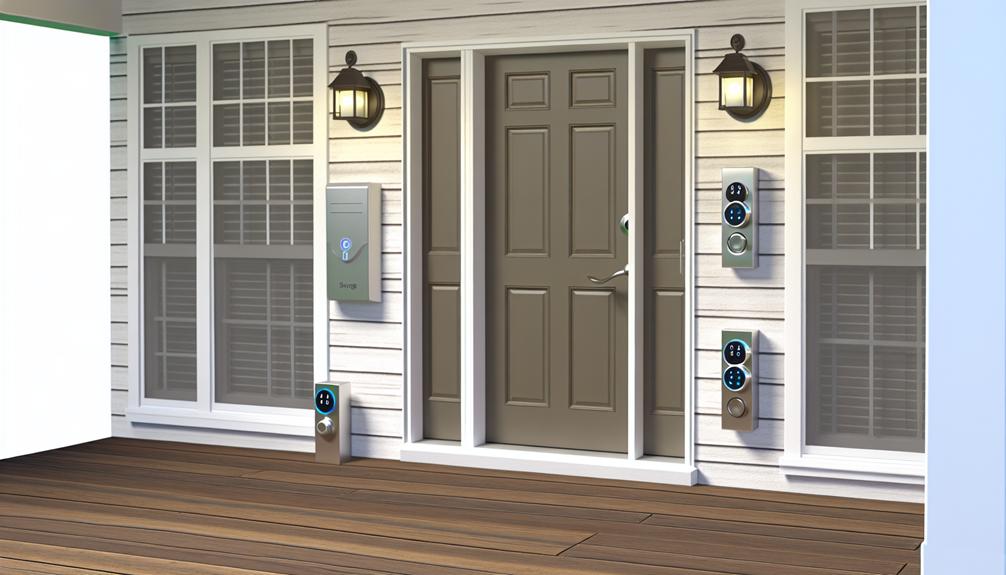
Finding budget-friendly smart locks doesn’t mean compromising on security or functionality. With a bit of research, we can find smart locks that offer robust security features and easy installation without breaking the bank.
Here are some top choices that balance cost and quality effectively:
- Wyze Lock: Known for its effortless installation tips and broad compatibility options with existing deadbolts, Wyze Lock integrates well with various smart home ecosystems.
- August Smart Lock (3rd Gen): This model provides seamless compatibility with most single-cylinder deadbolts and offers essential security features like remote access and auto-lock.
- Yale Assure Lock SL: With its key-free design, this lock minimizes potential vulnerabilities and includes detailed installation tips in the package. It’s compatible with Z-Wave and Zigbee networks.
- Kwikset Kevo: Featuring touch-to-open technology, this lock offers straightforward installation and supports multiple compatibility options, including Amazon Alexa and Google Assistant.
- Schlage Encode: This lock boasts built-in Wi-Fi, eliminating the need for additional hubs, and includes robust security features such as encrypted locking mechanisms.
Each of these options is designed with ease of maintenance in mind, featuring durable materials and low upkeep requirements.
High-Security Selections
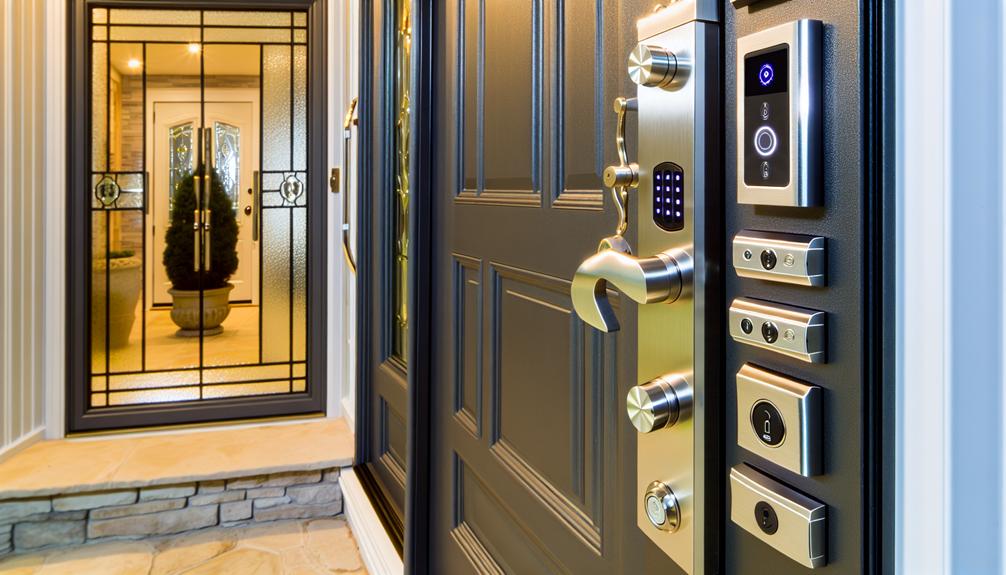
For those of us prioritizing top-tier security features, high-security smart locks offer advanced encryption, biometric authentication, and tamper-resistant designs to safeguard our New Jersey homes.
Advanced encryption guarantees that our lock’s data transmission remains secure from cyber threats. The AES-256 bit encryption standard, often used in these locks, is the same level of security trusted by financial institutions, providing us with peace of mind.
Biometric authentication, including fingerprint and facial recognition, adds another layer of security that’s virtually impossible to replicate. This technology guarantees only authorized individuals gain entry, eliminating the risk of lost or copied keys.
Additionally, tamper-resistant designs protect against physical breaches. These locks often feature reinforced deadbolts and hardened steel components, making them resistant to drilling and other tampering techniques.
Customizable settings allow us to tailor access controls based on our specific needs. We can set temporary access codes for guests or service providers, and receive real-time notifications of lock activity. This level of control and flexibility is crucial for monitoring and managing home security effectively.
Weather-Resistant Models
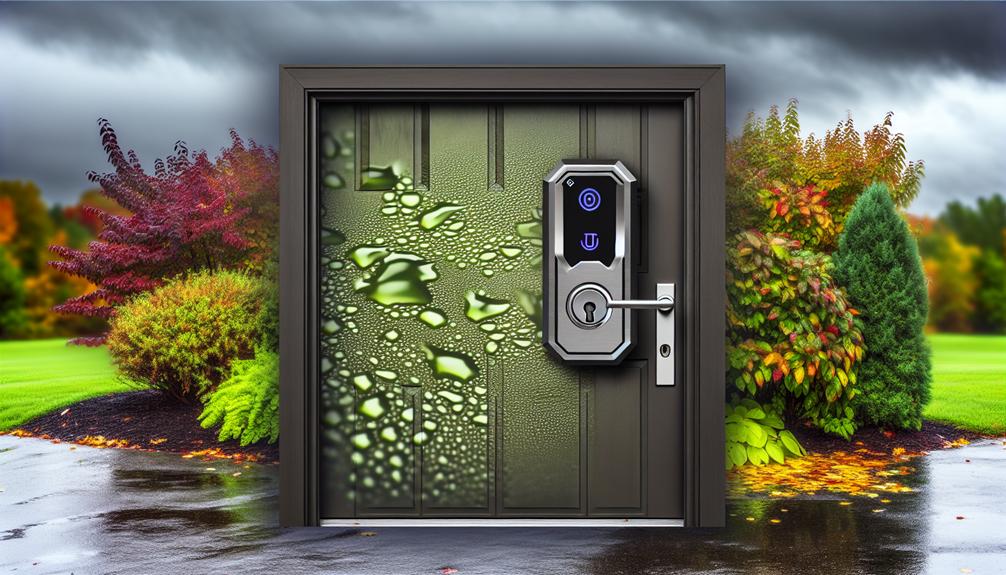
Understanding the importance of resilience, weather-resistant smart locks are engineered to withstand New Jersey’s diverse climate, incorporating materials and coatings that prevent corrosion and water ingress. These locks are built with a durable design that guarantees longevity, even under harsh environmental conditions.
When selecting the best weather-resistant model, we look for features that offer extreme weather protection. Here’s a breakdown of what sets these locks apart:
- Corrosion-Resistant Materials: High-grade stainless steel or zinc alloys are used to combat rust and corrosion caused by humidity and salt air.
- Waterproof Sealing: Advanced gaskets and sealants prevent water from penetrating the internal mechanisms, ensuring consistent performance in rain or snow.
- Temperature Tolerance: These locks operate effectively across a broad temperature range, from freezing winters to hot summers, thanks to specially formulated electronic components.
- UV Protection: A UV-resistant coating prevents fading and degradation from prolonged sun exposure, maintaining both function and appearance.
- Impact Resistance: Reinforced construction helps withstand physical impacts, including falling debris during storms or accidental knocks.
User-Friendly Interfaces
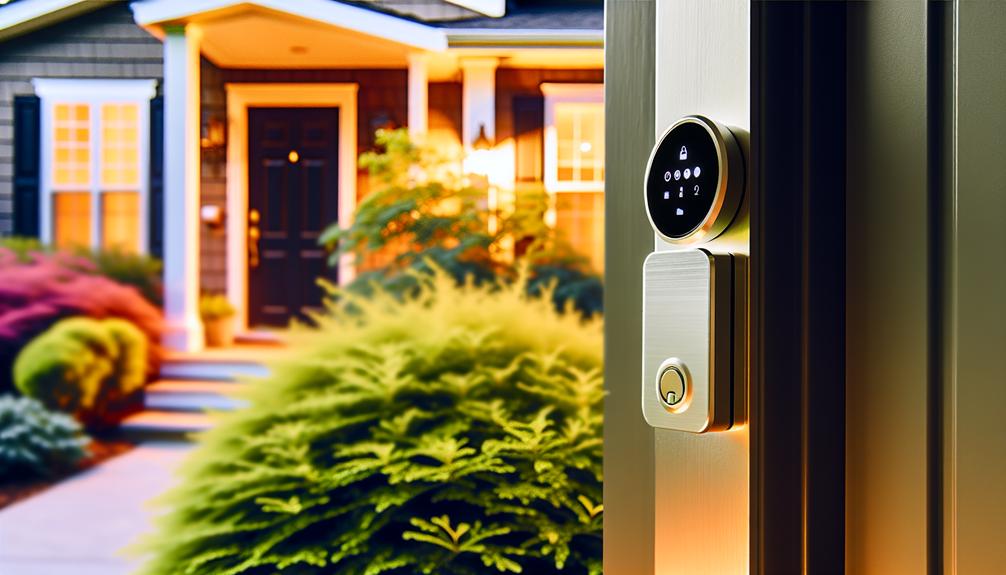
When evaluating smart locks, we need to prioritize user-friendly interfaces that enhance usability and security.
Intuitive app controls enable seamless access management, while a simple installation process minimizes setup time and technical difficulties.
Moreover, voice command integration with systems like Amazon Alexa and Google Assistant offers hands-free convenience, ensuring accessibility for all users.
Intuitive App Controls
Intuitive app controls for smart locks offer homeowners seamless access management through user-friendly interfaces, leveraging advanced algorithms and real-time data synchronization. With remote access, we can monitor and control our locks from anywhere, ensuring our homes are always secure. These apps provide a thorough suite of features designed to enhance our control and convenience.
Key functionalities include:
- Remote Access: Access or lock doors from any location, giving us peace of mind whether we’re at work or on vacation.
- Customizable Settings: Tailor access permissions for family members, guests, or service providers, ensuring that only authorized individuals can enter.
- Real-Time Notifications: Get instant alerts about lock activity, helping us stay informed about who’s coming and going.
- Audit Trails: Review detailed logs of access history to monitor patterns and detect any suspicious activity.
- Integration with Smart Home Systems: Seamlessly connect with other smart devices, creating a cohesive and automated home environment.
Simple Installation Process
With simple instructions and minimal tools required, the installation process for smart locks ensures that even those with limited technical expertise can quickly secure their New Jersey homes.
Many smart locks are designed for DIY installation, meaning we can handle it ourselves without needing a professional locksmith. This is essential for those of us who prefer to maintain control over home security systems.
Manufacturers typically include detailed, step-by-step guides and video tutorials that walk us through the process. The precise engineering of these locks guarantees that they fit standard door preparations, minimizing the need for additional modifications. We often need just a screwdriver to complete the installation, which saves us time and money.
Once installed, these smart locks offer remote access capabilities, allowing us to monitor and manage our locks from anywhere via smartphone apps. This feature is particularly beneficial for those of us who travel frequently or manage multiple properties.
The ability to grant temporary access codes to guests or service personnel adds another layer of convenience and control. By embracing these user-friendly interfaces, we not only enhance our home security but also simplify the overall management of our properties.
Voice Command Integration
Harnessing advanced technologies, smart locks now provide voice command integration, enabling us to manage access to our homes seamlessly through popular virtual assistants like Amazon Alexa and Google Assistant. This integration with smart speakers offers an unmatched convenience, yet it’s crucial to contemplate the balance between ease of use and security concerns.
Voice command reliability is a pivotal factor. We must guarantee that our smart locks accurately respond to our instructions while rejecting unauthorized attempts. Here’s what we should keep in mind:
- Smart speaker integration: Ensuring compatibility with our Alexa or Google Assistant devices.
- Security concerns: Implementing multi-factor authentication to prevent unauthorized access.
- Privacy implications: Understanding how voice data is stored and managed by smart lock manufacturers.
- Firmware updates: Regularly updating firmware to address vulnerabilities.
- Voice recognition: Utilizing advanced voice recognition technology to distinguish between users.
While the convenience of opening our doors with a simple voice command is appealing, we must evaluate it against potential privacy implications and the necessity for reliable voice command performance. By staying informed and proactive, we can enjoy the advantages of smart locks without compromising our home’s security.
Frequently Asked Questions
Are Smart Locks Covered by Homeowner’s Insurance in New Jersey?
We should check with our insurance providers to confirm if smart locks are covered by homeowner’s insurance in New Jersey. Insurance coverage often depends on the compatibility, remote access, and advanced security features of the smart lock system.
How Do Smart Locks Handle Power Outages?
During a power outage, smart locks often rely on battery backups to maintain functionality. For instance, Yale’s Assure Lock provides remote access and advanced security features, ensuring we can control our home’s access seamlessly even without power.
Can Smart Locks Be Used With Traditional Keys as a Backup?
Yes, most smart locks offer keyless entry for convenience, but they also include traditional key slots for emergency access. This provides remote access while addressing security concerns, ensuring we maintain control even during technical issues.
What Is the Battery Life of Most Smart Locks?
Can you guess the secret behind our smart locks’ long term reliability? It’s energy efficiency. Most smart locks boast a battery life of six months to a year, ensuring we stay in control without constant replacements.
Do Smart Locks Require Regular Maintenance?
Yes, smart locks need regular maintenance to guarantee peak smart lock security. After smart lock installation, we should periodically update firmware, check battery levels, and inspect mechanical components to maintain top performance and reliability.
Conclusion
To sum up, the top smart locks for New Jersey homes in 2024 provide a variety of features to meet a range of needs.
With keyless entry, biometric security, Wi-Fi, and Bluetooth connectivity, these choices are as adaptable as a Swiss Army knife.
Whether you’re seeking cost-effective options or top-notch security picks, our thorough review guarantees you’ll discover a model that merges creativity with dependability, enhancing the intelligence and safety of your home.
